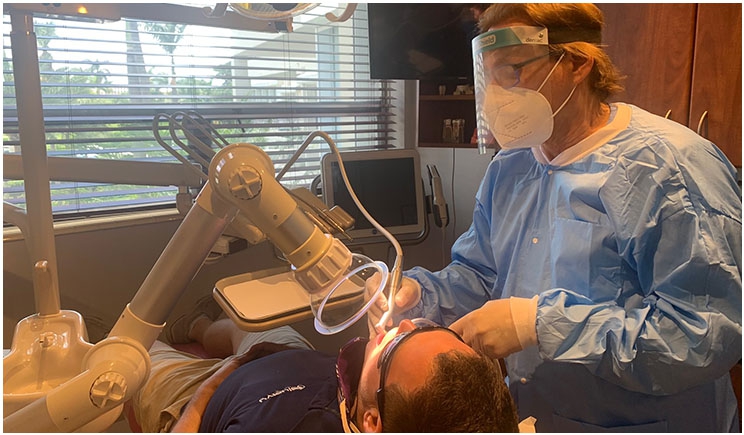
As we all know, many patients are avoiding the dentist’s office during the global pandemic. People are staying away from doctors’ offices and hospitals too, ignoring illnesses and checkups, out of fear of catching the novel coronavirus.
And when the World Health Organization recommended that patients delay routine dental visits, it convinced many people that dental care is secondary to overall healthcare. We know, of course, that this isn’t true. Even the ADA came out to support the field and confirm that dentistry is essential healthcare because of its role “in evaluating, diagnosing, preventing or treating oral diseases, which can affect systemic health.”
With that said, we’ve been putting in serious effort to make our offices as safe for our patients and staff as possible. Although there has not been any proof of transmission of COVID-19 in a dental office, we still want everyone to feel comfortable in knowing that we have implemented extraordinary safety measures and put in place exhaustive new procedures to increase the protection of our staff and patients.
Along with advanced personal protective equipment (PPE) and enhanced infection control procedures, many offices, including my own, have added innovative equipment such as extraoral suction units. These devices suck aerosols away from the mouth, preventing them from entering the airstream. High-speed-drill dental procedures and dental hygiene ultrasonic cleaning visits then can be performed safely.
Extraoral suction units remove 99.9% of aerosolized droplets of saliva, blood, and other fluids that can be emitted from a patient’s mouth during routine dental treatment. The units are a bit pricey, running well into the thousands, but the investment is worth it. When my patients are informed of the device’s existence and impending usage during their visits, they have not hesitated to schedule an appointment right away.
How Extraoral Suction Works
During treatment, doctors and hygienists utilize ultrasonic scalers, syringes, and high-speed and low-speed handpieces, all of which generate a large amount of water and mist, which, combined with saliva, blood, and other tissue, produce aerosols.
The extraoral suction device, which resembles the end of a vacuum cleaner with a clear funnel-shaped attachment positioned just outside the mouth, removes these aerosols to prevent them from passing between doctors and patients.
With strong suction vacuum pressure and a high air-suction flow rate, the aerosol droplets between the doctor or staff member and the patient are sucked into the machine through the adjustable positioning arm.
The aerosol is then decontaminated as it goes through a four-stage filtration and disinfection process, including an initial HEPA filter, ultraviolet-C light chamber, plasma generator, and large HEPA-13 filter. Ultimately, the droplets are discharged from the machine after thorough purification.
Having the extraoral suction unit in place keeps dental appointments efficient, reduces the risk of splatter, and allows dental hygienists to use the ultrasonic scaler in addition to hand scaling, resulting in better stain and tartar removal—and tartar is the direct cause of periodontal disease and bad breath.
Independent studies of extraoral suction units have shown a virus inactivation rate of greater than 99% and a 99.9% filtration rate of particles. More importantly, our patients truly appreciate the presence of these new devices. They feel safer knowing they are receiving treatment in a clean, clear, and dry environment.
Additionally, to assure patients that they are safe to visit the dentist’s office, dental professionals should:
- Wear full PPE (more than what is usually worn and changed frequently)
- Screen patients regarding recent travel and contact
- Take temperatures multiple times, such as when entering the building and at the office entrance
- Remove anything from the office and waiting room that is not a cleanable surface or easily disinfected
- Create chairside checklists that include procedures for dentists and staff while in individual operatory rooms and until the patient’s room is cleaned and disinfected
- Use only disposable tips for equipment to protect staff and patients.
Dr. Josephs practices implant cosmetic and general dentistry with an emphasis on implants, veneers, and complex crown and bridge treatment in Palm Beach, Florida. He is on the staff at JFK Medical Center and is a faculty advisory board member at McGill University’s Faculty of Dentistry. He completed his residency at Manhattan’s Beth Israel Medical Center and Mt. Sinai Hospital and was published in the Journal of the ADA in October 2017. He also is a twice published author, writing Tooth Talk and More Tooth Talk, the latter publishing in 2020. Learn more at palmbeachdentist.com.
Related Articles
Warn Your Patients About the Risks of DIY Dentistry
OSHA Issues Guidelines on Workplace Ventilation
Air Quality Enhancements Boost Dental Practice Infection Control











